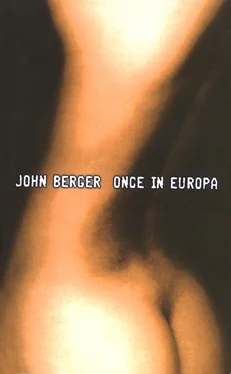John Berger - Once in Europa
Здесь есть возможность читать онлайн «John Berger - Once in Europa» весь текст электронной книги совершенно бесплатно (целиком полную версию без сокращений). В некоторых случаях можно слушать аудио, скачать через торрент в формате fb2 и присутствует краткое содержание. Год выпуска: 2014, Издательство: Bloomsbury Publishing, Жанр: Современная проза, на английском языке. Описание произведения, (предисловие) а так же отзывы посетителей доступны на портале библиотеки ЛибКат.
- Название:Once in Europa
- Автор:
- Издательство:Bloomsbury Publishing
- Жанр:
- Год:2014
- ISBN:нет данных
- Рейтинг книги:3 / 5. Голосов: 1
-
Избранное:Добавить в избранное
- Отзывы:
-
Ваша оценка:
- 60
- 1
- 2
- 3
- 4
- 5
Once in Europa: краткое содержание, описание и аннотация
Предлагаем к чтению аннотацию, описание, краткое содержание или предисловие (зависит от того, что написал сам автор книги «Once in Europa»). Если вы не нашли необходимую информацию о книге — напишите в комментариях, мы постараемся отыскать её.
Once in Europa — читать онлайн бесплатно полную книгу (весь текст) целиком
Ниже представлен текст книги, разбитый по страницам. Система сохранения места последней прочитанной страницы, позволяет с удобством читать онлайн бесплатно книгу «Once in Europa», без необходимости каждый раз заново искать на чём Вы остановились. Поставьте закладку, и сможете в любой момент перейти на страницу, на которой закончили чтение.
Интервал:
Закладка:
Do you remember when I took you to him? You’d burnt the palm of your hand with a firecracker. It wasn’t serious but you were howling your head off. Michel came out from behind the counter with his stiff, swaying movement — like a skittle. Let’s go into the back room, he said. I made as if to accompany you but he shook his head and the two of you disappeared. He closed the door and within seconds you stopped howling. Not gradually but suddenly in mid-cry. There wasn’t a sound in the shop. Total silence. After what seemed an eternity I couldn’t bear it anymore and shouted your name. You came bounding through the door laughing. Michel lumbered after you. There were already grey hairs in his black head.
You don’t have to burn yourself in order to come and see me, he said when I thanked him and kissed him good-bye.
Later I asked you: What happened?
Nothing.
What did Michel do?
He showed me one of his burns.
Where?
Here — you pointed at your tummy.
And your hand stopped hurting?
No, it wasn’t hurting anymore. It stopped hurting before he showed me his burn.
Why did he show it to you then?
Because I asked him.
What are we doing here, Christian, on this earth, in this sky?
I’d been working in the Components Factory for ten years. On the wall beside my bench there were thirty postcards of the Mediterranean and palm trees and cows and cherry trees in flower and a village with a steeple — all of them sent to me over the years by friends on holiday. Gaston had understood the reality of our situation. When he stood behind me, pretending to oversee my work, I could sense his regret in my shoulder blades, because I could also sense my own. The racket of the machines month after month, year after year, wore away principles. The years were long. When I didn’t sleep the nights too were long.
The factory shut for the month of August. We never went away for a holiday like some of the others. I gave Mother a hand in the garden. I made jam and bottled the last of the runner beans. When I passed the factory I no longer thought of Stepan. There is nothing in the factory which can have a memory. I thought of him when I ironed your shirts and cut your hair. I thought of him too when I did my face in the mirror. I was ageing. I looked as though I’d been married for twenty years.
Do you know how to measure a smile? Stepan asked.
Yes, I said.
He bent down and picked me up so my mouth was level with his and he kissed me.
You had a friend called Sébastien, whose father was the caretaker of the holiday camp in Bakon, on the other side of the Roc d’Enfer. Some Thursdays when there was no school, you spent the day with him up there. I was glad because the mountain air did you good. Cluses is like a dungeon. When the holiday camp was full of kids from the cities in the north, you wanted to go and find out if there were any flying enthusiasts. Here, you said, people don’t have a clue. Already I couldn’t follow you talking about “aerofoils” and “wing loadings.” I’m not sure Sébastien understood much either. His passion was fiddling with television sets. He could come into Michel’s shop and talk like a schoolmaster for an hour about new transistor circuits. Sébastien was twelve and you were eleven when in August ’66 you went to spend a whole fortnight with him up in Bakon.
I didn’t have to go to work and I was by myself, alone as I hadn’t been for ten years. On the second day I did something I hadn’t done since Stepan’s death: I didn’t get dressed at all, I lay in bed, I listened to the radio, I took a shower when I was too hot, I remembered, I didn’t get up. Mother would have been deeply ashamed of me. Papa, examining the cruel crevices in his hands, would have looked up and said with a wink: Why not, if she can? My life already seemed inexplicably long. The next day I spent at the swimming pool sunbathing. From having to stand too much at work I was developing varicose veins. My hands weren’t like Papa’s but they were red and rough. I was never taught to swim. I made an appointment at the hairdresser’s. Mother had never once been to a hairdresser in her life.
Coming out of the hairdresser’s with a scarf over my head, I saw Michel on the other side of the road. He was walking on crutches. I waved and he didn’t see me. His head was down and it looked as though the going was painful. I waited for the traffic and then I ran across the street. When at last he saw me, his face, red and glistening with sweat, broke into a smile.
What a surprise! Always in his faraway voice.
I’ve just had my hair done.
Come and have a coffee.
We went to the brasserie by the post office. A waiter offered him a chair. Obstinately he took another.
Why don’t you take off your scarf?
Order me a café au lait and I’ll be back. I went to the toilet.
Ah! Odile! A beautiful head of hair you have there! All his words had to be hurled across the ravine of what had befallen him.
It’s too fine. It breaks too easily.
Too fine? I wouldn’t know what too fine was! He drank from his glass of white wine and lemonade. You remember the trip we made to Italy?
I nodded.
Thirteen years ago.
The only time I’ve ever been on a motorbike. Afterwards you told me I was a good passenger.
Your outfit has closed down for the whole month?
Like every year.
What about a trip to Paris?
Paris! It’s hundreds of kilometres away.
We take the car and we take four days, there and back. I have to go anyway to get a prosthesis adjusted. It’s not satisfactory … the left one here. If you came with me, it would be a holiday. What do you say?
It’s a long way.
Don’t put your scarf on again.
Are we, Christian, a mother and child flying in the sky?
At that moment I was twenty-nine; Michel was thirty-seven. If I’d been told as a child what the life of an adult is like, I wouldn’t have believed it. I’d never have believed it could be so unfinished. When young we lend so much authority and sureness to our elders. Michel and I had seen and lived a good deal, and yet, as we followed the Rhône along the gorge through the end of the Jura Mountains, we were like children. When I think of it now, I want to protect us.
It was a white Renault 4. He had covered the seats with a fabric, striped like a zebra skin. He liked putting on a strong eau de cologne which, mixed with sweat and the August heat, smelt like mule. I’d bought a pair of white net gloves for the trip. In my whole life I never dreamt of wearing gloves in the summer but I’d seen this pair in a shop in Cluses, a shop where the bosses’ wives bought their haberdashery, and I said to myself: What the hell, Odile, if you’re going to Paris, Paris of all places on this earth, and you’ve got a smart pair of white shoes, you may as well wear white net gloves in August. In addition, they were at half-price.
When I think of us on our way to Paris, I want us to come to no harm.
The white cat died last week. She was hit by a car. Michel was at the shop and I went out into the garden and I heard a meow. She was in the grass by the edge of the road. Her back was broken, so I put her to lie on a blanket by the stove in the kitchen. She lay there, her white mouth a little open and her tongue scarcely less white than her teeth. She turned — or her body turned her — onto her side with her four legs stretched out and her hind legs straight behind her, as if she were leaping. Slowly, with her two forelegs she wiped her face, moving her paws down from her ears over her eyes towards her mouth. She did this once only, rubbing the vision of life out of her eyes. When her paws reached her mouth she was dead.
Can there be any love without pity?
The Jura are not like our mountains. They are more morose, more resigned to their fate. They would never cover a car seat with zebra skin nor wear white gloves in August. We passed a lake which looked as though no boat had ever sailed upon it. Michel talked about General de Gaulle and I didn’t know whether he hated or admired him. Next he talked about the factory. It belonged now to a multinational with factories in twenty-one different countries. TPI. The multinationals, Michel said, are the new robber barons of our time. TPI made eight thousand five hundred million francs profit in ’66.
Читать дальшеИнтервал:
Закладка:
Похожие книги на «Once in Europa»
Представляем Вашему вниманию похожие книги на «Once in Europa» списком для выбора. Мы отобрали схожую по названию и смыслу литературу в надежде предоставить читателям больше вариантов отыскать новые, интересные, ещё непрочитанные произведения.
Обсуждение, отзывы о книге «Once in Europa» и просто собственные мнения читателей. Оставьте ваши комментарии, напишите, что Вы думаете о произведении, его смысле или главных героях. Укажите что конкретно понравилось, а что нет, и почему Вы так считаете.












